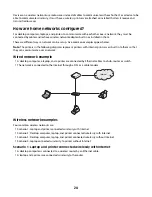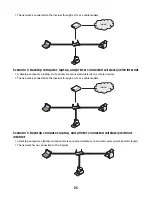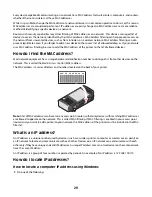
3
Continue following the on-screen instructions.
What is the difference between infrastructure and ad hoc
networks?
Wireless networks can operate in one of two modes: infrastructure or ad hoc.
In infrastructure mode, all devices on a wireless network communicate with each other through a wireless router.
Devices on the wireless network must have valid IP addresses for the current network and share the same SSID and
channel as the wireless router (wireless access point).
In ad hoc mode, a computer with a wireless network adapter communicates directly with a printer equipped with a
wireless print server. The computer must have a valid IP address for the current network and be set to ad hoc mode.
The wireless print server must be configured to use the same SSID and channel that the computer is using.
The following table compares the characteristics and requirements of the two types of wireless networks.
Infrastructure
Ad hoc
Characteristics
Communication
Through wireless access point
(wireless router)
Directly between devices
Security
More security options
Range
Determined by range and number
of wireless access points (wireless
routers)
Restricted to range of individual
devices on network
Speed
Usually faster
Usually slower
Requirements for all devices
Unique IP address for each device
Yes
Yes
Mode set to
Infrastructure mode
Ad hoc mode
Same SSID
Yes, including the wireless access
point (wireless router)
Yes
Same channel
Yes, including the wireless access
point (wireless router)
Yes
Lexmark recommends setting up a network in infrastructure mode using the installation CD that came with the
printer.
Infrastructure mode is the recommended setup method because it has:
•
Increased network security
•
Increased reliability
•
Faster performance
•
Easier setup
27
















































